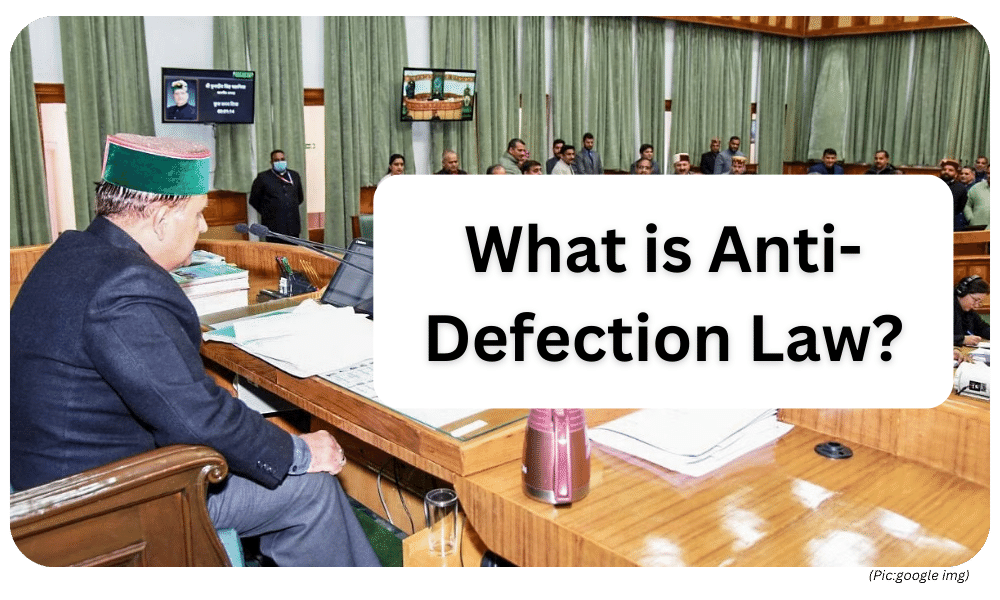What is the news?
-
- Under the anti-defection law, six Congress MLAs who cross-voted for the BJP in the Himachal Pradesh Rajya Sabha elections were disqualified.
- Himachal Pradesh Assembly Speaker Kuldeep Singh Pathania disqualified those MLA’s. Disqualified MLAs voted against their party’s candidate. Sudhir Sharma, Rajinder Rana, Inder Dutt Lakhanpal, Devinder Kumar Bhutoo, Ravi Thakur, and Chetanya Sharma were disqualified. In the state’s political crisis, the Congress had 40 legislators in the 68-member Assembly.
- The BJP has 25 seats, and the remaining three members are independents. The Rajya Sabha election resulted in a tie, with both candidates securing 34 votes. The BJP’s candidate, Harsh Mahajan, was declared the winner based on a draw of lots. The disqualification was filed by the state’s Parliamentary Affairs Minister, Harsh Wardhan Chauhan, invoking the anti-defection law.
What is an anti-defection law?
-
- The anti-defection law in India, officially known as the Tenth Schedule of the Constitution, is a legislation aimed at curbing legislators from switching political parties during their term in office. It was enacted in 1985 to bring stability to governments and prevent legislators from defecting for personal gains, which could potentially cause the collapse of the government.
Here’s a breakdown of the law:
Historical background:
-
- The Tenth Schedule – popularly known as the Anti-Defection Act – was included in the Constitution via the 52nd Amendment Act, 1985 and sets the provisions for disqualification of elected members on the grounds of defection to another political party.
- It was a response to the toppling of multiple state governments by party-hopping MLAs after the general elections of 1967.
Disqualification for Defection:
-
- The law applies to Members of Parliament (MPs) and Members of Legislative Assemblies (MLAs) in both national and state legislatures.
Grounds of Disqualification:
-
- If an elected member voluntarily gives up his membership of a political party.
-
- If he votes or abstains from voting in such House contrary to any direction issued by his political party or anyone authorised to do so, without obtaining prior permission.
-
- As a pre-condition for his disqualification, his abstention from voting should not be condoned by his party or the authorised person within 15 days of such incident.
-
- If any independently elected member joins any political party.
-
- If any nominated member joins any political party after the expiry of six months.
Exceptions:
The law doesn’t apply to:
-
- Speakers/Chairpersons of the Houses.
- Situations where an entire party merges with another party, provided at least two-thirds of the merging party’s legislators agree.
Important:
-
- As per the 1985 Act, a ‘defection’ by one-third of the elected members of a political party was considered a ‘merger’.
But the 91st Constitutional Amendment Act, 2003, changed this and now at least two-thirds of the members of a party have to be in favour of a “merger” for it to have validity in the eyes of the law.
- As per the 1985 Act, a ‘defection’ by one-third of the elected members of a political party was considered a ‘merger’.
Who decides disqualification?
-
- The Speaker/Chairman of the respective legislative house has the final authority in deciding disqualification on the grounds of defection.
Important:
-
- The decision on questions as to disqualification on ground of defection are referred to the Chairman or the Speaker of such House, which is subject to ‘Judicial review’.
- However, the law does not provide a time-frame within which the presiding officer has to decide a defection case.
Can a member disqualified under defection, re-contest during the same term from a different political party or independently?
- Yes, A recent Supreme Court ruling confirmed this.
-
- The BJP won 104 seats in the 2018 Karnataka State Assembly elections. The INC-Janta Dal (Secular) alliance, with 117 seats, formed the government with H.D. Kumaraswamy as Chief Minister.
- Many INC-JD (S) lawmakers joined BJP in 2019. K.R. Ramesh Kumar, the former Karnataka Assembly Speaker, disqualified seventeen defectors for the rest of the term under the Anti-defection law. This prevented defectors from running for re-election or entering the Assembly for three and a half years.
Supreme Court heard the case. This Court upheld the defectors’ disqualification but stated:
-
- The Speaker cannot disqualify a member until the conclusion of the term under the Constitution. A member disqualified under the Tenth Schedule is barred from being appointed as a Minister or holding any remunerative political post from the date of disqualification until the expiration of his term or if he is re-elected to the legislature, whichever is earlier.
- The Speaker cannot prevent candidates from running.
- Even though it looks fair, the Anti-defection law has significant flaws.
Make it Simple:
-
- Let A have 60 legislators and B have 50 after a State Assembly election. Since A possesses over half the State Assembly, it may form the government.
- Let’s imagine 20 A legislators resigned and joined B due to B’s political manoeuvring. Disqualify the legislators immediately. Right now, their support for B is meaningless. But something unexpected happened: House strength dropped to 90, giving B the majority to form the government.
- The disqualified legislators might also run in the by-elections and win again.
How Does Defection Impact Politics?
Undermining Election Mandates:
-
- Defection occurs when legislators are elected on one party’s ticket but subsequently switch to another for ministerial or financial benefits.
Impacts government operations:
-
- The 1960s legislator defections prompted the “Aaya Ram, Gaya Ram” slogan.
- Defection causes government instability and administration issues.
Support Horse Trading:
-
- Defection fosters legislator horse-trading, which goes against democracy.
Law criticism:
-
- Critics say the law gives the Speaker too much power, which can prejudice his decisions.
- The merger loophole can be exploited to stage defections.
- The 91st amendment exempted anti-defection verdicts.Instead of a ‘split’, the amendment accepts a ‘merger’ in a legislature party.
- The anti-defection law has stabilised Indian politics, but its efficacy and improvements remain debated.
QuizTime:
Mains Questions:

Question 1:
The recent disqualification of MLAs in Himachal Pradesh has reignited the debate on the Anti-Defection Law. Discuss the objectives of the law and critically evaluate its effectiveness in curbing political instability, considering the recent developments.(250 words)
Model Answer:
The Anti-Defection Law, enshrined in the Tenth Schedule of the Indian Constitution, aims to curb defections from political parties to promote stability in government and legislatures. It discourages floor-crossing motivated by personal gain rather than ideological differences.
Effectiveness of the Law:
Positives:
-
- The law has provided some stability to governments, especially in multi-party coalitions.
- It discourages opportunistic defections that can topple governments.
Negatives:
-
- The power to disqualify an MLA rests with the Speaker, who could be biased towards the ruling party. This undermines the law’s impartiality.
- The recent case in Himachal Pradesh highlights the challenge of balancing party discipline with individual conscience.
- The law can be misused to stifle dissent within parties.
Recent Developments:
-
- The Himachal Pradesh case raises questions about the interpretation of defying a party whip and its consequences. A rigid application can stifle dissent, while a lenient approach might risk instability.
Conclusion:
-
- The Anti-Defection Law remains a work in progress. Striking a balance between party discipline and individual conscience is crucial. Reforms like an independent body to decide disqualification petitions could enhance the law’s effectiveness.
Question 2:
The Anti-Defection Law differentiates between a ‘merger’ and a ‘split’ within a political party. Explain this distinction and analyze its implications for the law’s application.(250 words)
Model Answer:
The Tenth Schedule recognizes a ‘merger’ of two or more parties as a legitimate event, exempting members from disqualification. However, a ‘split’ within a party is not recognized, and dissenting members can be disqualified.
Implications:
-
- This distinction creates a loophole. A party facing potential defections can engineer a merger with another party to avoid disqualification, potentially defeating the law’s purpose.
- It can stifle genuine dissent within a party, as members fearing disqualification might hesitate to voice their opinions.
Conclusion:
-
- The distinction between ‘merger’ and ‘split’ creates ambiguity and weakens the Anti-Defection Law. Amending the law to provide clearer definitions or recognizing legitimate splits within parties could be considered.
Remember, these are just two examples of UPSC Mains questions inspired by the current news. Feel free to modify and adapt them further to fit your specific needs and writing style. Good luck with your preparation!
Relevance to the UPSC Prelims and Mains syllabus under the following topics:

Prelims:
-
- General Studies I: This section might cover the Tenth Schedule of the Constitution, which deals with Anti-Defection. You should be familiar with its broad provisions.
Mains:
-
- Indian Polity and Governance: This section delves deeper into the Constitution and political processes. Here’s where you can discuss the Anti-Defection Law in more detail. You can analyze its:
Constitutional basis (Tenth Schedule)
Objectives (promoting party discipline, stable governments)
Provisions (disqualification for defection)
Consequences of disqualification (Articles 75(1B), 164(1B), 361B)
Criticisms and their validity
- Indian Polity and Governance: This section delves deeper into the Constitution and political processes. Here’s where you can discuss the Anti-Defection Law in more detail. You can analyze its:










0 Comments